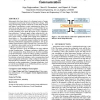Free Online Productivity Tools
i2Speak
i2Symbol
i2OCR
iTex2Img
iWeb2Print
iWeb2Shot
i2Type
iPdf2Split
iPdf2Merge
i2Bopomofo
i2Arabic
i2Style
i2Image
i2PDF
iLatex2Rtf
Sci2ools
152
click to vote
DAC
2003
ACM
2003
ACM
A survey of techniques for energy efficient on-chip communication
Interconnects have been shown to be a dominant source of energy consumption in modern day System-on-Chip (SoC) designs. With a large (and growing) number of electronic systems being designed with battery considerations in mind, minimizing the energy consumed in on-chip interconnects becomes crucial. Further, the use of nanometer technologies is making it increasingly important to consider reliability issues during the design of SoC communication architectures. Continued supply voltage scaling has led to decreased noise margins, making interconnects more susceptible to noise sources such as crosstalk, power supply noise, radiation induced defects, etc. The resulting transient faults cause the interconnect to behave as an unreliable transport medium for data signals. Therefore, fault tolerant communication mechanisms, such as Automatic Repeat Request (ARQ), Forward Error Correction (FEC), etc., which have been widely used in the networking community, are likely to percolate to the SoC d...
DAC 2003 | Design Automation | Efficient On-chip Communication | On-chip Interconnects | SoC Communication Architectures |
Related Content
| Added | 13 Nov 2009 |
| Updated | 13 Nov 2009 |
| Type | Conference |
| Year | 2003 |
| Where | DAC |
| Authors | Vijay Raghunathan, Mani B. Srivastava, Rajesh K. Gupta |
Comments (0)

